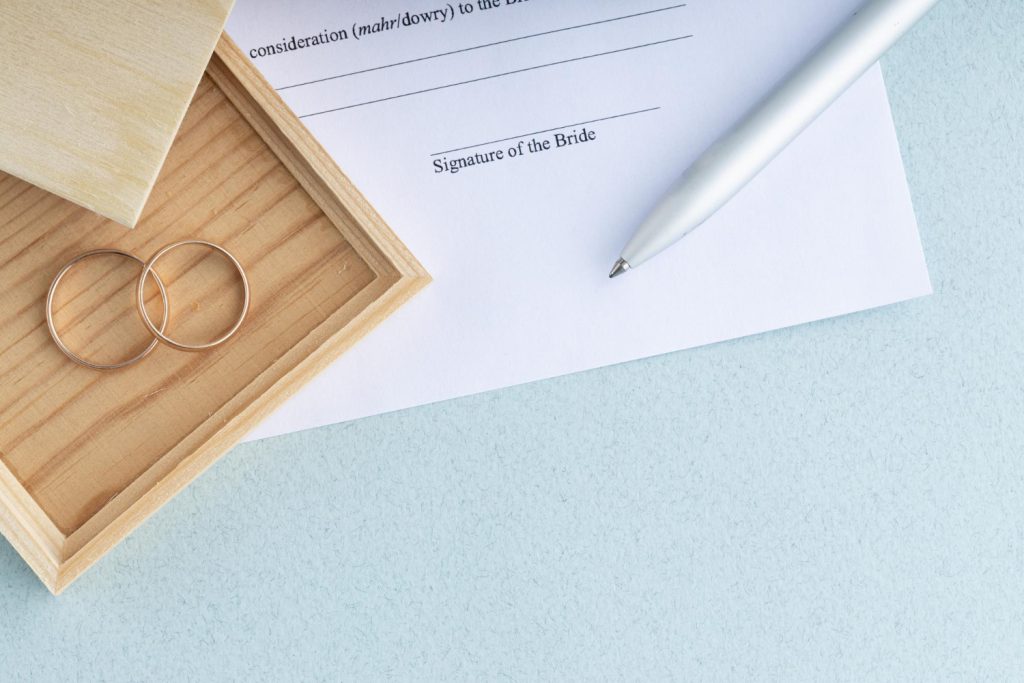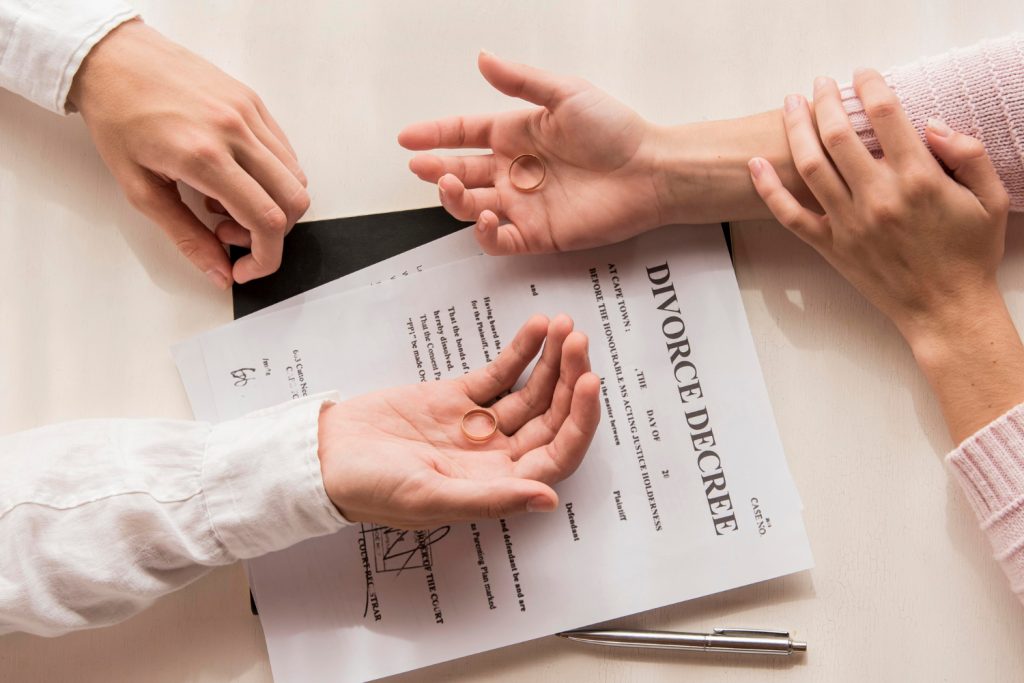A divorce decree is a legal document the court grants when a divorce is officially finalized. A final divorce decree is a contract with the outlined terms of marriage dissolution that the spouses should follow, including the details on property and debt division, child custody and support, alimony, and other issues relevant to the case. If you google “What is a divorce decree?”, the results will also show you “judgment of divorce” or “divorce judgment,” which are interchangeable terms.
In addition to its legally binding force, a divorce decree is necessary when managing social and financial matters once a marriage dissolution is over. For instance, you will need this document when changing your name on official papers, updating taxing information, or altering insurance policies.
Remember that there may be some fluctuations in the divorce decree meaning when we are talking about an absolute and limited divorce decree.
- Absolute Divorce Decree
An absolute divorce decree can also be called a final divorce decree. When a decree absolute is issued, your marriage is completely terminated. Thus, former partners can remarry.
The judgment of absolute divorce contains information on how all divorce-related issues are resolved. So, the parties clearly understand how they will maintain child custody, who will pay child support, etc. The terms specified are final and binding.
- Limited Divorce Decree
A limited divorce decree is a court order that outlines the same details as an absolute divorce decree but is issued when spouses apply for a limited divorce, also referred to as a court-mandated separation. Therefore, the parties aren’t legally divorced, which means they can’t remarry but live apart. This temporary legal arrangement is an option for some spouses due to religious reasons, the desire to preserve insurance benefits, or a legal requirement to live separately for a specified period before pursuing an absolute divorce.
Divorce Decree vs. Divorce Certificate
Besides a divorce decree, former spouses can also get a divorce certificate once their marriage ends. There are several differences between these 2 documents. Check out the tablet to understand them.
| Divorce Decree vs Divorce Certificate | ||
| Document | Divorce Decree | Divorce Certificate |
| Purpose | The court issues this comprehensive legal document when a marriage is officially dissolved. It includes the terms of a divorce, e.g., assets division, child custody and support, etc. | This simple document contains basic information about a divorce case. It is issued by the state’s Vital Records Office with the primary aim of confirming that a marriage has ended. |
| Contents | A divorce decree is a detailed document with information about the legal actions taken during a divorce process and the court’s rulings on various issues. It can consist of several pages. | A divorce certificate is a slimmed-down version of a divorce decree, typically 1 page long. It usually includes basic details of the proceedings, such as the names of the parties, the date of a divorce, the name and address of the court, etc. |
| Legal Implications | The court order is legally binding, meaning spouses must follow the terms specified after a divorce. The document includes the rights and responsibilities of ex-spouses. | It is an official proof that marriage termination has taken place; it doesn’t include specific terms and conditions of a divorce for the parties to live by. |
Do you get a divorce certificate and a divorce decree once the process is over? Yes, all couples can get a certified copy of a divorce decree from the clerk’s office. To obtain a copy of a divorce certificate, you need to go to the state’s health department or Bureau of Vital Records.
What Is Included in a Divorce Decree?
The content of a divorce decree depends on the case specifics. Typically, it covers the following sections:
- Identification information: personal data of the parties and the date and location of a marriage registration.
- Grounds for divorce: they can be different across the country. Some states recognize only a no-fault reason for divorce, namely irreconcilable differences, while others also distinguish fault-based grounds such as adultery, cruelty, abandonment, etc.
- Division of property: agreements on splitting marital property and liabilities, which usually refer to joint real estate, financial accounts, debts, vehicles, and other items purchased by spouses during marriage.
- Child custody & support: decisions on legal and physical child custody, a parenting plan, and amount, frequency, and methods of paying child support.
- Alimony: type, amount, conditions, and duration of spousal support.
If either spouse plans to change a name once a divorce is finalized, the decree should include details about the name change.
How to Get a Copy of Your Divorce Decree?
If you wonder how to get a copy of the divorce decree, you should take the following steps:
- Identify the court where your marriage was dissolved.
- Prepare documents that confirm your identity.
- Visit the court clerk’s office.
- Request a divorce decree copy from the clerk. Typically, a person asking for a copy has to fill out a request form and provide a valid identification document: a passport or a driver’s license.
- Pay the associated fee. The sum varies across jurisdictions. You can learn the cost right in the court or check out the official website to prepare in advance.
- Wait for the request to be processed. Sometimes, people can receive a copy immediately, but there are also cases when the paper is available in several days.
In some states, it is possible to request a divorce decree copy online. Since this is a more convenient and faster option, the number of search requests for “How do I get a copy of my divorce decree online?” is high. The process is rather simple. You need to:
- Visit the official website of the court where your divorce was granted.
- Create an account.
- Fill out a request form.
- Pay fees online.
- Review the data and send the form. After submitting the request, you may receive a confirmation email or notification. It may include details on how to track the status of your request.
- Download a digital copy of your divorce decree.

When Is a Divorce Final?
A divorce is finalized when a judge signs a final judgment of divorce. Usually, it happens after a hearing where the judge studies the case, reviews a settlement agreement if a divorce is uncontested, or makes the decisions on crucial issues themselves if a couple pursues a contested divorce. So, if you wonder, “How do I know if my divorce is final?”, you need to ensure the judge has signed a divorce decree.
In some states, spouses have to comply with a waiting period before they can get finalized divorce papers. During this time, partners may attend mediation sessions to reach a mutually favorable agreement. Besides, if spouses have kids, they are obliged to attend parenting classes. A couple may also use a waiting period for resolving disputes or reassessing their relationship and even decide to reconcile. If a reunion doesn’t take place once the waiting period is over, the court will review a divorce case. So, when is a divorce final? It finalizes when the judge makes final decisions on the case and issues the decree.
What happens after the judge signs the divorce decree? Spouses can receive copies from the clerk’s office and use the document in the future when changing names, creating personal bank accounts, etc. Sometimes, however, a copy of a divorce certificate will suffice for such tasks. It is better to check the requirements in each specific case. A more serious effect of a divorce decree is that the document denotes that the parties are legally allowed to remarry.
Another question that may interest ex-spouses is, “How long does a divorce decree last”? The document doesn’t have an expiration date. Thus, its terms are generally meant to be permanent. After you receive a signed divorce decree, which means your divorce is finalized, you and your ex-spouse must stick to the legal decisions specified in the document. They remain in effect unless any party asks the court for modification.



